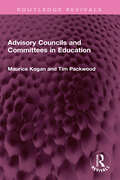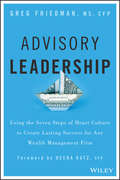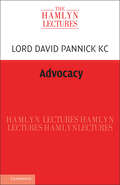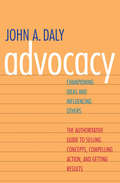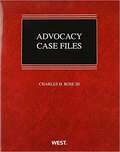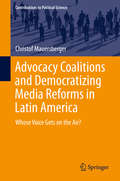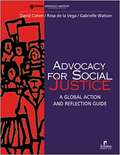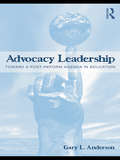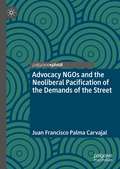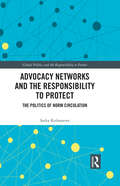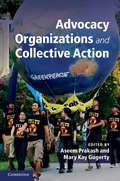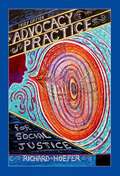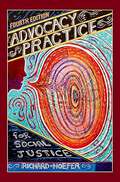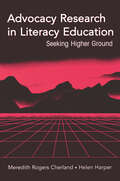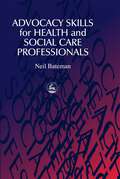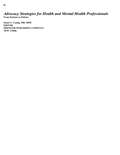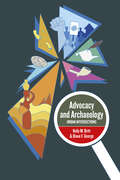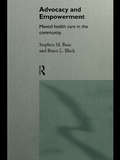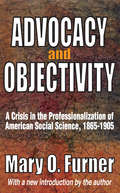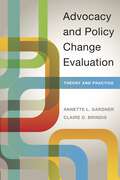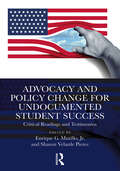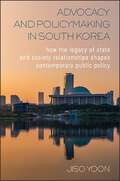- Table View
- List View
Advisory Councils and Committees in Education (Routledge Revivals)
by Maurice Kogan Tim PackwoodFirst published in 1974, Advisory Councils and Committees in Education is an analytical account of the role of advisory councils and committees in creating and promulgating educational policies. The book reviews systematically the content of twenty-eight reports starting with the Hadow Report of 1926, in terms of developments in educational philosophy, government and administration, social policy and the economics of education. It also analyses the membership and working of the committees. The study is based on historical and organizational analysis. It is concerned not only with what the councils did but takes up the wider questions of the place of such councils and committees in educational government and their relevance for changing assumptions about other ways in which government is advised. This book will be of interest to students of education, pedagogy and public policy.
Advisory In Urban High Schools
by Kate PhillippoFar from being solely imparters of information, teachers have long been tasked with multiple and increasing responsibilities. Recent decades have now seen a formal expansion of these responsibilities, adding often-unfamiliar duties to teachers' already full plates. Advisory in Urban High Schools explores the expanded roles of teachers who serve as advisors to students, a role that often demands teachers provide social-emotional support to their advisees. Through an in-depth study of teachers in multiple small, urban high schools with advisory programs, this book considers the precedents for the advisor's role; the interpretations, enactments, and responses teachers bring to the advisor's role; and the experiences of and outcomes for students.
Advisory Leadership: Using the Seven Steps of Heart Culture to Create Lasting Success for Any Wealth Management Firm
by Deena B. Katz Greg FriedmanThrive in a changing industry by putting your people first Advisory Leadership is a practical and highly executable guide for financial advisors and finance professionals looking to thrive in today's changing financial services industry. Written by a leading financial advisor with practice improvement expertise, this book shows you how to master the art of leadership while remaining agile and adaptable. You'll learn the seven steps you must take to keep pace and thrive amidst the industry's evolution, with clearly articulated explanations and motivational action items. The discussion covers patience, integrity, compassion, respect, consistency, encouragement, and courage--the foundations of success and continued growth--and shows you how to practice what you preach with real strategies for living the vision and being a true leader. The financial services industry is at a crossroads, between a generation on the cusp of retirement and the new generation stepping in to take its place. This transition has been called a crisis of culture, of values, and of communication, but it's really an opportunity. This book faces the changes head-on, and delivers practical solutions that start and end with your greatest resource--your people. Unlock the secrets to a people-first company Speak openly, walk the walk, and promote personal growth Reward firm-wide collaboration and a team mentality Reshape your company's DNA to thrive in today's financial environment The industry's overarching question is one of differentiation: how can your firm stand out amid the rise of robo-solutions and an unpredictable future? Advisory Leadership shows you how a people-focused company culture can elevate a firm from surviving to thriving.
Advocacy
by David Kc PannickLord Pannick celebrates advocacy: that controversial legal issues are decided in court after reasoned argument in which the participants refrain (usually) from shouting, personal insults or threats, and the points on each side of the debate are tested for their relevance, their accuracy, and their strength. The book seeks to identify the central characteristics of good and bad advocacy with the aid of examples from courtrooms in the UK and abroad. Lord Pannick also examines the morality of advocacy - that the advocate sets out views to which he does not necessarily subscribe, on behalf of clients for whom she may feel admiration, indifference, or contempt. Lord Pannick seeks to answer the question he is often asked - more by friends than by judges - 'How can you act for such terrible people?'. Finally, he addresses the future of advocacy, arguing it should and will survive pressures for efficiency and technological developments.
Advocacy
by David Ross QcAdvocacy, first published in 2007, explains how to win cases in court. Focusing on the techniques and methods of successful advocates, David Ross QC shows how to prepare a case for court. Writing in simple, clear language he gives the benefit of his many years of local and international experience. This second edition features new advice about how to prepare for, and run, an appeal, as well as how to write effective submissions to court. It also describes: • how to hold a court's attention • how to start and stop a witness • how to cross-examine all types of people, from liars to experts • the methods of taking objections to questions • how to address a jury • how to follow etiquette and behave ethically • how to win impossible cases All the principles of advocacy are explained, from the striking start to knowledge of human affairs, and Advocacy is rich with examples taken from real cases.
Advocacy
by John DalyWhen a group of people gather together to generate ideas for solving a problem or achieving a goal, sometimes the best ideas are passed over. Worse, a problematic suggestion with far less likelihood of success may be selected instead. Why would a group dismiss an option that would be more effective? Leadership and communications expert John Daly has a straightforward answer: it wasn't sold to them as well. If the best idea is yours, how can you increase the chances that it gains the support of the group? In Advocacy: Championing Ideas and Influencing Others, Daly explains in full detail how to transform ideas into practice. To be successful, leaders in every type of organization must find practical and action-oriented ways to market their ideas and achieve buy-in from the members of the group. Daly offers a comprehensive action guide that explains how to shape opinion, inspire action, and achieve results. Drawing on current research in the fields of persuasion, power relations, and behavior change, he discusses the complex factors involved in selling an idea--the context of the communication, the type of message being promoted, the nature and interests of the audience, the emotional tenor of the issues at stake, and much more. For the businessperson, politician, or any other member of a group who seeks the satisfaction of having his or her own idea take shape and become reality, this book is an essential guide.
Advocacy And Opposition: An Introduction To Argumentation, Seventh Edition
by Karyn Charles Rybacki Donald Jay RybackiAdvocacy and Opposition: An Introduction to Argumentation presents a comprehensive and practical approach to argumentation and critical thinking for the beginner who needs to construct and present arguments on questions of fact, value, and policy. Advocacy and Opposition offers a theoretical view of the nature of argument in our society, a discussion of arguing as a form of communication, and a focus on how arguments are created using the Toulmin model of argument. By blending traditional and contemporary views on the nature of argument (including multicultural perspectives on the purpose and process of argument, ethics, and values), Advocacy and Opposition makes students more aware of both the development of theory and practice, providing a well-rounded approach to their study of argumentation.
Advocacy Case Files (Coursebook)
by Charles H. RoseThis text contains two real-world case files reflecting the realities of 21st Century trial practice. Designed from the ground up to challenge and develop a student's advocacy skills and analytical excellence, the text's multiple potential levels of complexity adapt easily for use with any advocacy text. The complete teacher's manual provides a thorough case analysis, suggested assignments, and outcome-driven assessments, enabling the professor to focus on teaching the law, skill, and art of advocacy.
Advocacy Coalitions and Democratizing Media Reforms in Latin America: Whose Voice Gets on the Air? (Contributions to Political Science)
by Christof MauersbergerThis book examines democratizing media reforms in Latin America. The author explains why some countries have recently passed such reforms in the broadcasting sector, while others have not. By offering a civil society perspective, the author moves beyond conventional accounts that perceive media reforms primarily as a form of government repression to punish oppositional media. Instead, he highlights the pioneering role of civil society coalitions, which have managed to revitalize the debate on communication rights and translated them into specific regulatory outcomes such as the promotion of community radio stations. The book provides an in-depth, comparative analysis of media reform debates in Argentina and Brazil (analyzing Chile and Uruguay as complementary cases), supported by original qualitative research. As such, it advances our understanding of how shifting power relations and social forces are affecting policymaking in Latin America and beyond.
Advocacy For Social Justice: A Global Action And Reflection Guide
by David Cohen Rosa De la Vega Gabrielle WatsonAdvocacy for Social Justice is the first guide for worldwide social and economic justice advocates. It is a direct and interactive response to the growing need for NGOs to assume new policy advocacy roles. The authors consider why it is essential to build a civil society and nurture democracy as a means of sustaining continued mainstream development. Ideal for practitioners, trainers, or students of activism, the guide uses the elements of advocacy and expounds on current issues using comprehensive case studies.
Advocacy Leadership: Toward a Post-Reform Agenda in Education (Critical Social Thought)
by Gary L. AndersonIn this timely and important new book, Gary Anderson provides a devastating critique of why a managerial role for educational leaders is counterproductive, especially for improving opportunities for low-income students and students of color, and instead proposes ways of re-theorizing educational leadership to emphasize its advocacy role. Advocacy Leadership lays out a post-reform agenda that moves beyond the neo-liberal, competition framework to define a new accountability, a new pedagogy, and a new leadership role definition. Drawing on personal narrative, discourse analysis, and interdisciplinary scholarship, Anderson delivers a compelling argument for the need to move away from current inauthentic and inequitable approaches to school reform in order to jump-start a conversation about an alternative vision of education today.
Advocacy NGOs and the Neoliberal Pacification of the Demands of the Street
by Juan Francisco Palma CarvajalThis book critically explores the role of two advocacy NGOs actively involved in processes of education policymaking during the recent education reforms carried out in Chile, the country known as the first laboratory of neoliberalism around the world. Based on Foucault’s theoretical work on governmentality the book argues that neoliberalism as a form of governmentality has permeated in Chilean policymaking, generating new forms of domination through freedom by situating NGOs as active and responsible subjects of government. In this way, this volume contests the supposed benefits of NGOs as a force to enhance democracy and foment social participation, arguing instead, that NGOs image as representatives of civil society can be used to pacify social movements demands for radical change and build a political consensus that serves to legitimate government interests in policymaking.
Advocacy Networks and the Responsibility to Protect: The Politics of Norm Circulation (Global Politics and the Responsibility to Protect)
by Sarka KolmasovaThis book contributes to existing debates on the Responsibility to Protect (R2P) by demonstrating new advocacy strategies and the greater interconnectedness of various R2P proponents. In 2021, the UN General Assembly adopted a new resolution on R2P, which reaffirmed its commitment from the 2005 World Summit Outcome and put R2P on the annual agenda. For many R2P proponents, this was another manifestation of worldwide R2P relevance and of growing support among UN members to protect people from genocide, war crimes, ethnic cleansing and crimes against humanity. Yet the existing crises in Myanmar, Venezuela, Belarus, Syria and many others revealed the widening gap between the discourse and practice. This book aims to find out what keeps the concept alive despite its indisputable pitfalls. In contrast to existing studies that treat the R2P endorsement or contestation as intertwined processes of norm evolution, it argues that the status of R2P has been accomplished by the conscious politics of its advocates operating in complex global networks. As such, the book puts emphasis on the agency of R2P champions and examines who keeps the idea resonating and how they manage to preserve its worldwide relevance. Rather than proposing a new model of advocacy, the book aims to pinpoint the politics of R2P's circulation, the importance of individual R2P champions and their interconnectedness through innovative forms of cooperation within complex networks. This book will be of much interest to students of the R2P, diplomacy, human rights, foreign policy and International Relations.
Advocacy Organizations and Collective Action
by Mary Kay Gugerty Aseem PrakashAdvocacy organizations are viewed as actors motivated primarily by principled beliefs. This volume outlines a new agenda for the study of advocacy organizations, proposing a model of NGOs as collective actors that seek to fulfil normative concerns and instrumental incentives, face collective action problems, and compete as well as collaborate with other advocacy actors. The analogy of the firm is a useful way of studying advocacy actors because individuals, via advocacy NGOs, make choices which are analytically similar to those that shareholders make in the context of firms. The authors view advocacy NGOs as special types of firms that make strategic choices in policy markets which, along with creating public goods, support organizational survival, visibility, and growth. Advocacy NGOs' strategy can therefore be understood as a response to opportunities to supply distinct advocacy products to well-defined constituencies, as well as a response to normative or principled concerns.
Advocacy Practice For Social Justice
by Richard HoeferCurrent economic and social forces are creating a society with less equality, justice and opportunity for all but the privileged few. Social workers are called upon by their code of ethics to counteract these trends and actively work to achieve social justice. Hoefer's empirically-based,step-by-step approach demonstrates how to integrate advocacy for social justice into everyday social work practice. The book shows through anecdotes, case studies, examples, and the author's own personal experiences, exactly how advocacy can be conducted with successful outcomes. Each chapter builds upon the previous to provide a concise yet detailed blueprint for conducting successful advocacy. The previous two editions of this book have been used and admired by professors and students alike. Students value its clarity and praise the book for opening their eyes to what they often believed was "the scary and bad" world of politics and policy. After reading the book, they are motivated to become advocates for social justice because they understand how to do so. If you want to empower your students to effect changes in laws, regulations, and other types of policy at all levels, you will find this text the perfect resource to do so.
Advocacy Practice for Social Justice
by Richard HoeferSince the publication of its first edition in 2005, Advocacy Practice for Social Justice has served as a clear, comprehensive, and practical resource for social work courses in advocacy, community practice, and macro practice. Now in its fourth edition, this text provides extensive information on the value base for advocacy; an examination of why people get involved in advocacy; and step-by-step instructions for social workers and others who want to impact laws, regulations, and policies at any level. Bearing in mind the National Association of Social Workers' Code of Ethics' requirements to advocate on behalf of vulnerable populations, readers learn that advocacy is a problem-solving technique similar to that used in social work practice of all types. The book moves through the stages of advocacy: getting involved; understanding the issue; planning; advocating through education, persuasion, and negotiation; presenting information effectively; monitoring and evaluating results; and integrating advocacy into a social worker's everyday practice. The fourth edition's inclusion of new topics and solid foundation in social work values make it a must-read as social work students and practitioners work diligently to maintain the profession's focus on successful advocacy for social justice.
Advocacy Research in Literacy Education: Seeking Higher Ground
by Helen Harper Meredith Rogers CherlandThis book reviews what the authors term advocacy research in literacy education-research that explicitly addresses issues of social justice, equity, and democracy with the distinct purpose of social transformation. It surveys what educational researchers who are working for social justice have accomplished, describes current challenges, and outlines future possibilities. The first section maps the terrain of advocacy research in literacy education. The authors group this large and expanding body of research into four categories: Critical Literacy(ies); Radical Counternarratives in Literacy Research; Literacy as Social Practice; and Linguistic Studies. Each chapter describes the research area, traces its history, provides example studies, and assesses the contributions of research to advocacy work now and potentially in the future. The second section provides a deeper consideration of challenges to the field of advocacy research and suggests future directions for research and scholarship; this section reflects the need to complicate and trouble the terms and relations between and among social justice, ethics, democracy, freedom, and literacy. As a whole, this book is a response to the current popular understandings of literacy education that limit the efficacy of advocacy work in these troubled times-understandings that support the proliferation of standardized testing, teacher testing, and scripted lessons and programs, along with the privileging of particular forms of research. Intended for those who work or soon will work in literacy education-students, teacher educators, researchers, and practitioners-this book represents the authors' belief that it is time for advocacy workers to strengthen and intensify their efforts to promote the most principled, effective literacy education for democratic life. It is their hope that this book will contribute to such an effort.
Advocacy Skills for Health and Social Care Professionals
by Neil BatemanMost professionals working in health or social care will be required to act as advocates as part of their work. A social worker or community nurse may need to obtain extra benefits or a particular service for a client; a housing official may need to help a tenant whose benefit has been delayed thus placing them at risk of homelessness; a voluntary body may decide to challenge a statement of special educational needs for a child. This is a practical guide to advocacy skills specifically written for those in the health and social care professions. Neil Bateman examines the function of advocacy within these professions and how to interview, negotiate and self-manage successfully. He provides a structure for advocacy, a guide to the ethical implications and advice on litigation and legal matters. Accessible and comprehensive, Advocacy Skills for Health and Social Care Professionals will be an essential resource for all those wishing to improve their practice.
Advocacy Strategies For Health And Mental Health Professionals: From Patients To Policies (Springer Ser.)
by Stuart L. LustigIt is becoming much more common for mental health providers to become community mental health advocates, and given the complexities and nuances associated with tasks such as getting involved with legislative issues or fund raising, a work like this serves an important and useful purpose. It is concise, yet revealing, and explains concepts in clear and practical language. Most importantly, it delivers on its promise to transform its readers into more savvy participants in the process of advocating for their mental health patients."
Advocacy and Archaeology: Urban Intersections
by Kelly M. Britt and Diane F. GeorgeArchaeologists have a history of being prime agents of change, particularly in advocating for protection and preservation of historical resources. As more social issues intersect with archaeology and historical sites, we see archaeologists and others continuing to advocate for not only historic resources, but for the larger social justice issues that threaten the communities in which these resources reside. Inspired by the idea of revolution and excitement about the ways archaeology is being used in social justice arenas, this volume seeks to visualize archaeology as part of a movement by redefining what archaeology is and does for the greater good.
Advocacy and Empowerment: Mental Health Care in the Community
by Bruce L. Black Stephen M. RoseRelevant and thought-provoking, describes a new and imaginative approach to the needs of de-institutionalised people returning to care in the community. It shows that there is a challenging but dynamic contribution to be made by all community mental health workers in restoring dignity to the lives of those who have tragically been robbed of such a basic human need.
Advocacy and Objectivity: A Crisis in the Professionalization of American Social Science, 1865-1905
by Mary FurnerThis award-winning book of the Frederick Jackson Turner Studies describes the early development of social science professions in the United States. Furner traces the academic process in economics, sociology, and political science. She devotes considerable attention to economics in the 1880s, when first-generation professionals wrestled with the enormously difficult social questions associated with industrialization. Controversies among economists reflected an endemic tension in social science between the necessity of being recognized as objective scientists and an intense desire to advocate reforms.Molded by internal conflicts and external pressures, social science gradually changed. In the 1890s economics was defined more narrowly around market concerns. Both reformers and students of social dynamics gravitated to the emerging discipline of sociology, while political science professionalized around the important new field of public administration. This division of social science into specialized disciplines was especially significant as progressivism opened paths to power and influence for social science experts.Professionalization profoundly altered the role and contribution of social scientists in American life. Since the late nineteenth century, professionals have exerted increasing control over complex economic and social processes, often performing services that they themselves have helped to make essential. Furner here seeks to discover how emerging groups of American social scientists envisioned their role what rights and responsibilities they claimed how they hoped to perform a vital social function as they fulfilled their own ambitions, and what restraints they recognized.
Advocacy and Policy Change Evaluation: Theory and Practice
by Annette Gardner Claire BrindisThis is the first book-length treatment of the concepts, designs, methods, and tools needed to conduct effective advocacy and policy change evaluations. By integrating insights from different disciplines, Part I provides a conceptual foundation for navigating advocacy tactics within today's turbulent policy landscape. Part II offers recommendations for developing appropriate evaluation designs and working with unique advocacy and policy change–oriented instruments. Part III turns toward opportunities and challenges in this growing field. In addition to describing actual designs and measures, the chapters includes suggestions for addressing the specific challenges of working in a policy setting, such as a long time horizon for achieving meaningful change. To illuminate and advance this area of evaluation practice, the authors draw on over 30 years of evaluation experience; collective wisdom based on a new, large-scale survey of evaluators in the field; and in-depth case studies on diverse issues—from the environment, to public health, to human rights. Ideal for evaluators, change makers, and funders, this book is the definitive guide to advocacy and policy change evaluation.
Advocacy and Policy Change for Undocumented Student Success: Critical Readings and Testimonios
by Enrique G. Murillo Sharon Velarde PierceAdvocacy and Policy Change for Undocumented Student Success is a compelling exploration of the undocumented student experience in America, offering a deep dive into the advocacy, education, and systemic challenges faced by undocumented communities.Compiling the most significant work in the field in terms of its contributions to research and professional practice, this volume uncovers the historical struggles and triumphs of undocumented students and their families in their quest for educational access and equity. From pivotal legal milestones to personal narratives of resilience and adversity, this collection paints a comprehensive picture of the ongoing battle against legal and societal barriers. It delves into the mental health impacts of living undocumented and presents innovative strategies and policy reforms aimed at bridging the gap between harsh realities and hopeful aspirations. A clarion call to action, this volume is an invitation to join the fight for a more equitable and inclusive society, recognizing the vital contributions of undocumented individuals and advocating for systemic change.Advocacy and Policy Change for Undocumented Student Success is a must-have resource for graduate students and researchers in Educational Leadership and Policy, Multicultural Education, and Teacher Education. It will also be an important reading for educational leaders, teachers, counselors, administrators, and organizations that share a common interest in and commitment to the educational issues that impact undocumented students and their families.
Advocacy and Policymaking in South Korea: How the Legacy of State and Society Relationships Shapes Contemporary Public Policy
by Jiso YoonWho dominates in the contemporary policy process in South Korea? How do policy advocates engage in advocacy activities to exercise influence? Building on existing theories of state, society, and public policies in democracies, Advocacy and Policymaking in South Korea argues that the legacy of state-society relationships explains who influences and how in South Korean policymaking. The state-society relationship has been a popular framework to explain democratic transition and consolidation. Yet, few studies to date extend the approach to explain advocacy and policymaking across political systems. Jiso Yoon shows the relevance of the framework in explaining advocacy and policymaking today with empirical evidence drawn from the contemporary policy process in South Korea. In addition, she compares policy communities across new and old democracies, such as South Korea and the United States. In this regard, the comparative analysis included in the book sets an important research example for students of comparative public policy to follow.
